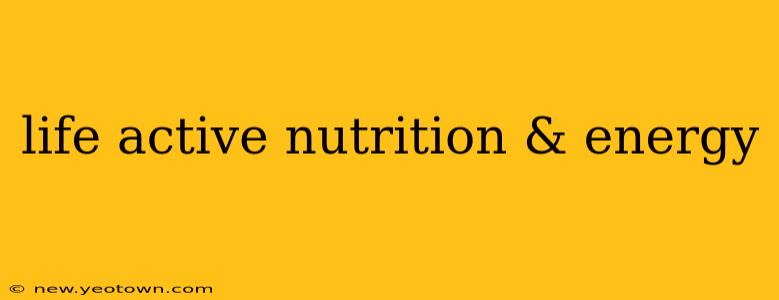We all crave that feeling: vibrant energy, a sharp mind, and a body that moves with ease. But achieving this optimal state isn't about magic pills or fad diets; it's about a holistic approach to nutrition and lifestyle. This journey begins with understanding how the food we eat directly impacts our energy levels and overall well-being. Let's explore the vital connection between active living, mindful nutrition, and sustainable energy.
What are the best foods for sustained energy?
The key to sustained energy isn't about quick sugar rushes, but about fueling your body with complex carbohydrates, healthy fats, and lean protein. Imagine this: you're embarking on a long hike. Would you grab a candy bar for fuel, or pack a nutritious lunch with whole grains, nuts, and lean meat? The latter provides lasting energy, unlike the temporary spike and crash from simple sugars.
Think whole grains like oats, quinoa, and brown rice. These release glucose slowly into your bloodstream, preventing energy dips. Lean proteins like chicken, fish, beans, and lentils provide sustained energy and support muscle repair. Healthy fats from avocados, nuts, seeds, and olive oil are crucial for hormone production and cell function, contributing to long-lasting energy. Fruits and vegetables offer vitamins, minerals, and antioxidants, further boosting your body's efficiency.
How can I improve my energy levels naturally?
Improving energy naturally is a multifaceted approach. It's not just about diet; it's about integrating healthy habits into your daily routine. Let's delve into some powerful strategies:
Prioritize Sleep:
Sleep is the cornerstone of energy. Aim for 7-9 hours of quality sleep each night. Establish a consistent sleep schedule, create a relaxing bedtime routine, and optimize your sleep environment for darkness and quiet. Insufficient sleep leads to fatigue, impaired cognitive function, and decreased physical performance.
Hydrate Consistently:
Dehydration is a silent energy thief. Even mild dehydration can lead to fatigue, headaches, and decreased cognitive function. Carry a water bottle and sip throughout the day. Listen to your body – thirst is a sign that you're already dehydrated.
Manage Stress:
Chronic stress depletes energy. Incorporate stress-reducing activities into your life, such as meditation, yoga, deep breathing exercises, or spending time in nature. These practices help regulate the body's stress response and promote relaxation.
Regular Exercise:
While it might seem counterintuitive to expend energy through exercise, regular physical activity actually boosts energy levels in the long run. Exercise improves cardiovascular health, increases oxygen flow to the brain, and releases endorphins, which have mood-boosting effects. Find an activity you enjoy, whether it's walking, swimming, cycling, or dancing.
What vitamins are good for energy?
While a balanced diet should provide most essential vitamins, certain nutrients play a crucial role in energy production. Vitamin B12 is vital for energy metabolism, often found in animal products. Iron is essential for carrying oxygen throughout the body, and a deficiency can lead to fatigue. Vitamin D supports immune function and energy levels; consider getting your levels checked. However, remember that supplementation should be done under the guidance of a healthcare professional to avoid potential imbalances.
How can I increase my energy without caffeine?
While caffeine can provide a temporary boost, relying on it can lead to dependence and energy crashes. Natural ways to increase energy without caffeine include the strategies discussed above: prioritizing sleep, staying hydrated, managing stress, and engaging in regular exercise. Furthermore, focus on a nutrient-rich diet packed with the energy-boosting foods mentioned earlier. These methods provide sustainable energy without the negative side effects of caffeine.
What are the signs of low energy?
Recognizing the signs of low energy is crucial for addressing the underlying causes. These signs can vary, but common indicators include persistent fatigue, difficulty concentrating, decreased motivation, irritability, and impaired physical performance. If you consistently experience these symptoms, consult a healthcare professional to rule out any underlying medical conditions.
By embracing a holistic approach to nutrition and lifestyle, you can unlock your body's natural energy reserves. It's a journey of mindful choices, sustainable practices, and a commitment to nourishing your body and mind for a vibrant, energetic life.

